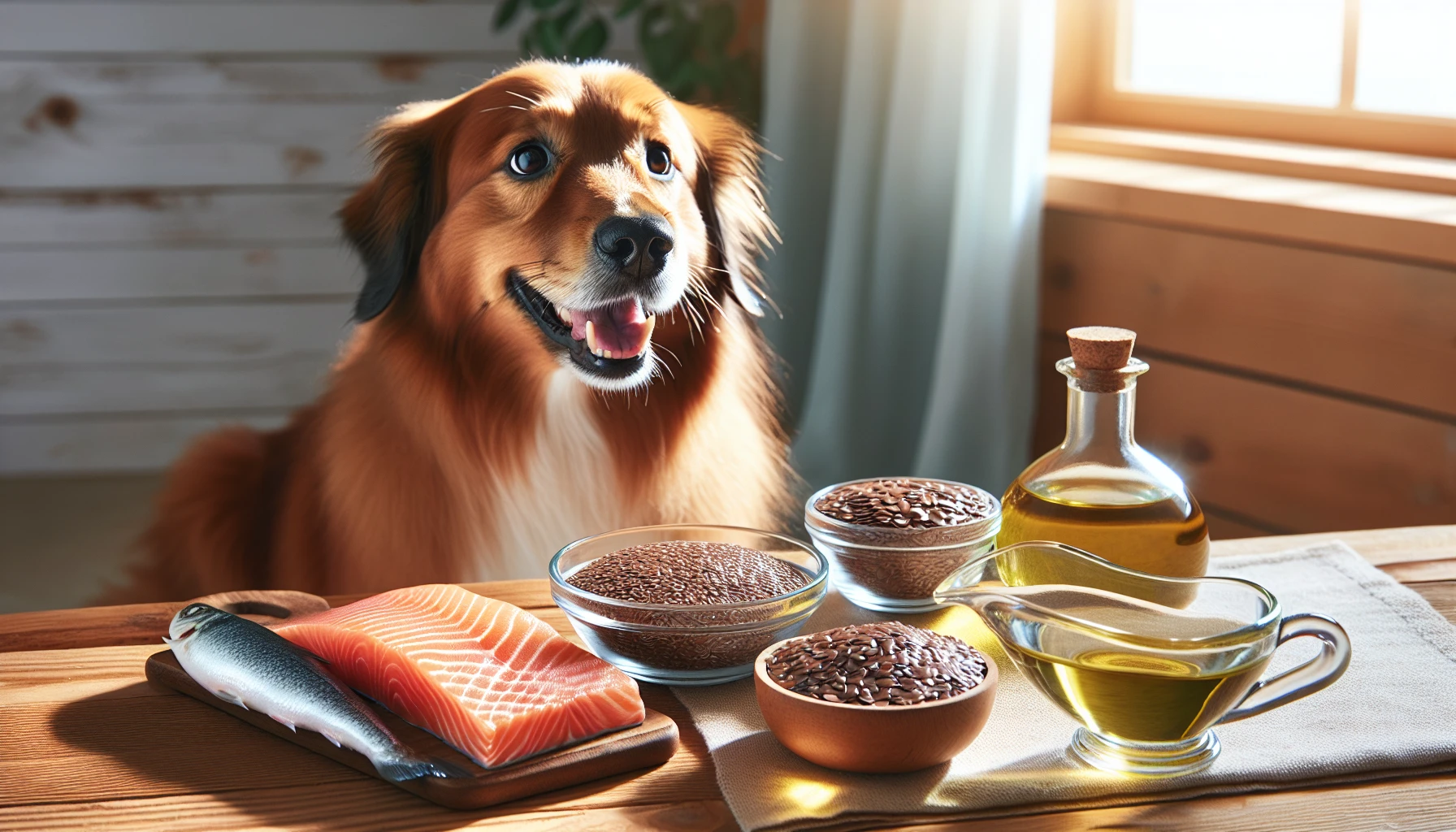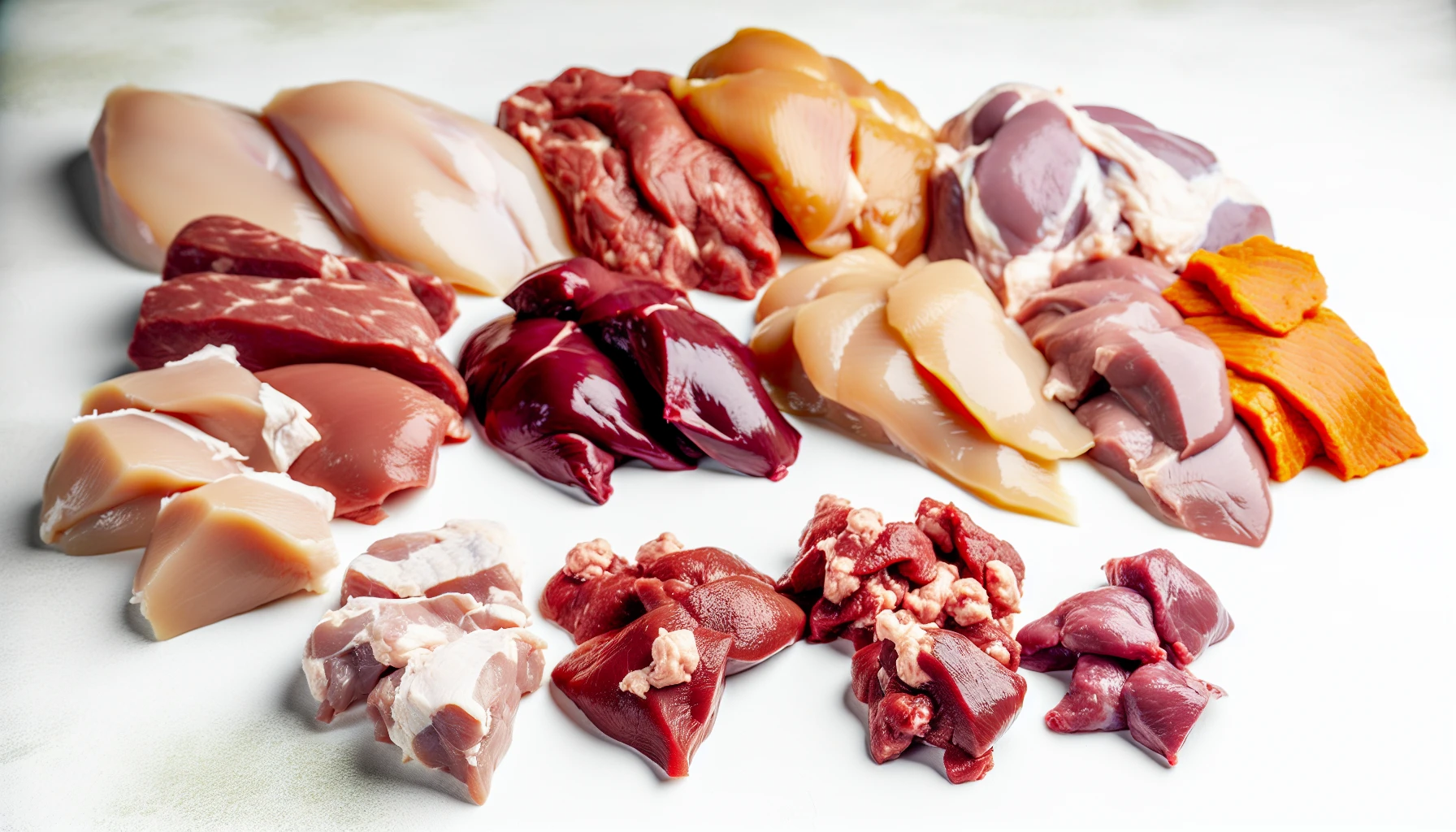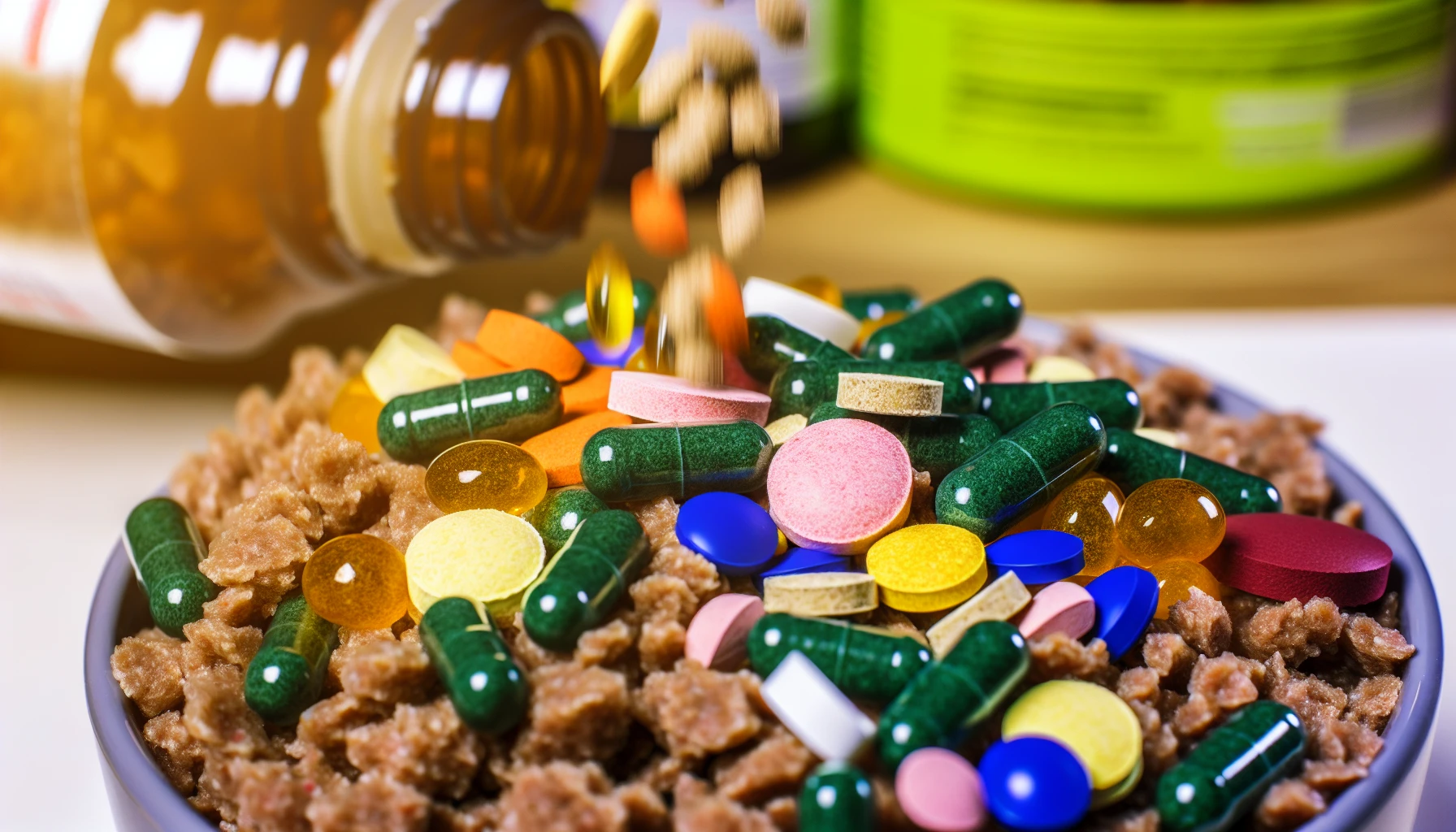Top Dog Supplements for Homemade Food: Essential Additions for a Balanced Diet

Imagine this: Your canine companion has been experiencing digestive issues and skin problems, and you suspect it might be due to the commercial dog food you’ve been feeding them. You decide to take matters into your own hands and start preparing fresh homemade dog food for your pet. But, where do you begin? Providing a balanced diet of fresh food is crucial for your dog’s health, and that means incorporating essential dog supplements for homemade food, healthy fats, and proteins into their homemade meals. In this blog post, we will discuss the importance of “dog supplements for homeade food” and guide you on how to create delicious and nutritious homemade dog food that caters to your dog’s specific needs and promotes overall well-being.
Key Takeaways
-
Ensure a proper, biologically appropriate diet for your dog by incorporating essential supplements into their homemade food.
-
Whole prey principles and whole food nutrients should be included to promote canine health, while healthy fats and proteins are necessary for optimal coat health.
-
Consult with a veterinarian or nutritionist when introducing any nutritional supplement other than real whole foods in order to determine the specific needs of your pet.
Essential Supplements for Your Dog's Homemade Diet
When making homemade dog food, concentrate on whole food sources of supplements such as:
-
beef
-
liver
-
heart
-
kidney
-
whole fish
-
bone broth
-
blood
These ingredients are the best sources for your dog’s nutritional balance because they provide essential vitamins, minerals, proteins, fats, and carbohydrates necessary for optimal health. Many pet owners are turning to homemade diets to ensure their dogs receive all the nutrients they need, and incorporating high-quality supplements into their pet’s daily regimen is highly recommended.
A well-balanced homemade diet should include real food based ingredients as a first line of support for your dog. If you feel you cannot get the right mix of raw ingredients (liver, organs, beef, fish) then it may be necessary to supplements with additional products.
The Role of Whole Food Nutrients in Homemade Dog Food
Whole food nutrients in dog food refer to natural, unprocessed ingredients that provide essential nutrients for dogs. These include:
-
Fresh fruits and vegetables such as carrots, celery, green beans, sweet potato, pumpkin, kale, broccoli, and spinach
-
Real meats, fish, and poultry
Including whole food nutrients in homemade dog food is significant as it supplies necessary vitamins, minerals, proteins, fats, and carbohydrates required for a dog’s peak health.
The incorporation of whole food nutrients into a homemade dog food recipe offers several advantages, including the benefits of homemade food, such as:
-
The ability to customize the diet
-
An increased fiber and nutrient content
-
The absence of preservatives
-
The potential to reduce the risk of canine medical conditions
-
Facilitate healthy weight maintenance
-
Improve digestion and nutrient absorption
Whether you have a young or senior dog, providing them with fresh, whole food ingredients will promote their health and wellbeing, just like when you prepare your own food.
Importance of Omega-3 Fatty Acids for Skin and Joint Health

Omega-3 fatty acids play a significant role in promoting healthy skin, coat, and joint function in dogs. Sources of Omega-3 fatty acids suitable for dogs include fish such as salmon, mackerel, herring, and tuna, as well as flaxseed oil and soybean oil. Omega-3 fatty acids are beneficial to a dog’s skin and coat health by moisturizing the skin, reducing shedding, preventing dandruff, and lessening itchiness. Additionally, they bolster the immune system, which contributes to overall skin health.
When it comes to joint health, Omega-3 fatty acids support by:
-
Reducing inflammation
-
Providing natural pain relief
-
Assisting in the management of osteoarthritis
-
Reducing lameness and discomfort in dogs
Specifically, eicosapentaenoic acid (EPA) and docosahexaenoic acid (DHA) are effective in supporting joint function. Including omega-3 fatty acids in a dog’s diet can significantly contribute to their joint health and overall wellbeing.
Probiotics: Boosting Your Dog's Digestive Health
Probiotics are advantageous bacteria that can enhance a dog’s digestive health. They support digestion, modulate the immune system, and generate short-chain fatty acids that battle detrimental bacteria. Probiotics aid in the regulation of other bacteria in the gut and combat yeast overgrowth. Generally utilized probiotic strains for dogs include Bifidobacterium and Lactobacillus.
Probiotics are especially advantageous for dogs with delicate stomachs as they can facilitate the reduction of flatulence, diarrhea, and the enhancement of overall digestive health. Probiotics for canines are available in a variety of forms, including powder, capsules, and chews. Introducing probiotics into your dog’s homemade diet will enhance their digestive health and overall well-being.
Crafting a Whole Prey-Inspired Homemade Meal
The concept of whole prey nutrition for dogs involves providing them with a diet that is analogous to what they would consume in the wild. This diet offers several advantages for dogs, such as:
-
Improved absorption and utilization of nutrients
-
Overall health promotion
-
Prevention of canine medical conditions
-
Support for healthy weight maintenance
-
Enhancement of immune function and metabolism
-
Reduction of inflammation and disease risk
Whole Beast, our flagship product, is formulated to accurately reflect the diet of wolves in the wild. It has been crafted to provide a balanced mix of nutrients essential for sustaining healthy skin and coat. Incorporating a whole prey-inspired homemade meal in your dog’s diet will assist them in achieving optimal nutrition and overall well-being.
Whole Beast: Crafted From the Diet of Wolves
Whole Beast is formulated to replicate the whole prey diet that wolves naturally ingest, which consists of highly nutritious animal tissues. The diet of wild wolves primarily comprised of hoofed mammals such as deer, elk, moose, and wild boar, and they also consumed smaller animals like birds, snakes, lizards, and fish. By incorporating a variety of meats, organs, and bones in their recipes, Whole Beast endeavors to furnish dogs with a balanced and natural diet that reflects the evolutionary diet of wolves.
Including all the prized components of a prey animal with human grade ingredients of beef, liver, heart, kidney, bone and blood, Whole Beast ensures dogs receive a nutrient-rich and comprehensive meal. A whole prey-inspired homemade meal supports various aspects of canine health, including immune system fortification, enhanced skin and coat health, optimal digestive and metabolic function, and promoting longevity and vitality.
Supporting Longevity with Whole Prey Principles
Providing your dog with a whole prey diet has numerous benefits. It supplies:
-
Variety
-
Fiber
-
Enrichment
-
Aids in the maintenance of clean teeth
-
Provides omega-3s without the requirement of marine sources
-
Fosters healthy skin and a lustrous coat
Whole prey nutrition is essential to support the various aspects of canine health, including immune function, reproduction, skin health, and digestion.
One can craft a whole prey-inspired homemade meal for dogs by following the prey model approach, which consists of 80% muscle meat, 10% raw meaty bone, and 10% secreting organs. Additionally, one can include fresh veggies such as zucchini and spinach for added nutrition. Adhering to whole prey principles in your dog’s homemade meals will support their longevity and vitality.
Tailoring Nutrition to Your Dog's Specific Health Concerns
Every dog is unique, and so are their nutritional needs. Tailoring your dog’s homemade diet to their specific health concerns, such as weight management and sensitivity to certain ingredients is necessary. By making adjustments to your homemade dog food recipes and selecting suitable ingredients, you can ensure that your canine companion is receiving a well-balanced diet that caters to their individual needs.
Whether your dog is struggling with weight management or has a sensitive stomach, a customized homemade diet can make a significant difference in their overall health and well-being. In the following subsections, we will discuss how to adjust recipes for weight management and select ingredients for sensitive stomachs.
Adjusting Recipes for Weight Management
Dogs, just like humans, need to maintain their ideal weight to stay healthy and active. Adjusting homemade dog food recipes for weight management involves making certain modifications to the diet, such as decreasing the total calorie content by reducing portion size or using lower-calorie ingredients, and increasing the amount of fiber in the recipe by incorporating vegetables like pumpkin, spinach, or kale.
To calculate the caloric needs of your dog for weight management, you can utilize the Resting Energy Requirements (RER) formula. For example, a 10kg (22lb) dog would require approximately 400 Calories/day. Tailoring your dog’s homemade meals to their specific caloric needs will help them maintain their ideal weight and promote optimal health.
Selecting Ingredients for Sensitive Stomachs
For dogs with sensitive stomachs, it’s crucial to choose ingredients that are easily digestible and low in fat. Some suitable options include lean meats such as chicken or turkey, cooked vegetables like sweet potatoes or carrots, and cooked grains such as brown rice. Additionally, it’s essential to avoid ingredients known to cause digestive distress, such as dairy products, corn, wheat, and soy.
When selecting ingredients for sensitive stomachs, consider incorporating easily digestible ingredients such as:
-
beef
-
liver
-
heart
-
eggs
-
fish
-
chicken
-
lamb
-
pumpkin
Providing your dog with a diet tailored to their sensitive stomach will help them enjoy their meals without discomfort and digestive issues.
Incorporating Healthy Fats and Proteins into Homemade Dog Food

Healthy fats and proteins are essential components of a well-balanced diet for dogs. They provide energy, facilitate muscle growth, and assist in maintaining a healthy coat. Including healthy fats and proteins in your dog’s homemade meals is significant to ensure they receive the necessary nutrients for optimal health.
In the following subsections, we will discuss how to choose lean meats and organ meats, as well as how to balance fats for optimal coat health in your dog’s homemade diet.
Choosing Lean Meats and Organ Meats
Lean meats, such as:
-
chicken
-
turkey
-
fish
-
grass- fed ground beef
-
pork tenderloin
are excellent sources of protein and essential nutrients for dogs. Organ meats, on the other hand, offer a range of health benefits for dogs. They are an excellent source of essential vitamins and minerals, which contribute to the overall health of the animal.
Incorporating a variety of lean meats and organ meats in your dog’s homemade meals will provide them with a nutrient-rich and balanced diet. Some examples of suitable organ meats to include in your dog’s homemade diet are liver, kidney, and heart. These organ meats can be added during the cooking process or used in raw dog food meal prep.
Balancing Fats for Optimal Coat Health

Fats are an essential component of a dog’s diet, as they help maintain healthy skin and coat. It’s important to balance the fats in your dog’s homemade dog food for optimal coat health. Sources of healthy fats include fish oil, flaxseed oil, and coconut oil. These fats provide essential fatty acids that promote a lustrous coat and healthy skin.
Incorporating a balanced mix of healthy fats and proteins in your dog’s homemade meals will support their overall health and wellbeing. Proper nutrition is key to ensuring that your canine companion maintains a healthy coat and enjoys a happy, active life.
Avoiding Common Pitfalls in Home Cooking for Dogs
Home cooking for dogs can be a rewarding experience, but it’s important to be aware of common pitfalls to ensure your dog’s health and safety when providing home cooked meals. Identifying signs of inadequate nutrition and avoiding harmful foods are key points in maintaining a well-balanced and healthy diet for your dog.
In the following subsections, we will discuss how to recognize inadequate nutrition signs and provide guidance on avoiding harmful foods in your dog’s homemade meals.
Recognizing Inadequate Nutrition Signs
Inadequate nutrition can have a range of consequences on a dog’s health, including:
-
Weight loss
-
Generalized weakness
-
A dull coat
-
Dry skin
-
Lack of energy
-
Gas
-
Diarrhea
-
Excessive shedding
If you notice any signs of inadequate nutrition in your dog, consult with a veterinarian or veterinary nutritionist to address the issue and make necessary adjustments to their diet. Proper nutrition is essential for your dog’s overall health and well-being.
Steering Clear of Harmful Foods
Certain foods, such as chocolate, onions, garlic, grapes can be toxic to dogs and should be avoided in their homemade meals. Other harmful ingredients include xylitol, a common artificial sweetener found in many human foods, which can cause serious health issues in dogs.
Avoiding harmful foods and providing your dog with a balanced and nutritious homemade meal will ensure their health and happiness. Always consult with a veterinarian or veterinary nutritionist if you have concerns about the ingredients in your dog’s diet.
How to Introduce Supplements into Your Dog's Food

Including essential supplements in your dog’s homemade meals is significant for providing a balanced diet. Start by consulting with a veterinarian or veterinary nutritionist to determine the specific supplements necessary for your dog’s individual needs. Once you’ve identified the appropriate supplements, introduce them gradually into your dog’s meals.
Carefully follow the instructions provided by the supplement manufacturer and adjust the dosage as needed based on your dog’s response and overall health.
Summary
In conclusion, creating a well-balanced and nutritious homemade dog food requires careful consideration of essential supplements, healthy fats and proteins, and tailoring the diet to your dog’s specific health concerns. By following the guidance provided in this blog post, you’ll be well on your way to providing your canine companion with the optimal nutrition they need to thrive. Remember, a healthy diet leads to a happy, active, and long-lived dog.
Frequently Asked Questions
What are the essential supplements for a dog's homemade diet?
Providing essential supplements for a dog's homemade diet is key to maintaining their health and well-being; these include whole food nutrients, Omega-3 fatty acids, and probiotics.
How do I balance fats and proteins in homemade dog food?
When making homemade dog food, ensure a balanced diet by incorporating lean meats and organ meats as protein sources, and adding healthy fats like fish oil, flaxseed oil, and coconut oil. Ideally, the majority of fat should come from raw meat and organs.
What adjustments can I make to my dog's homemade diet for weight management?
To help manage your dog's weight, adjust the diet by reducing portions or using lower-calorie ingredients, and adding fiber. Body weight management is also not just about diet - proper outlets for regular exercise are crucial to your dog's health longevity.
How can I tailor my dog's homemade diet to their specific health concerns?
Consult with a veterinarian or veterinary nutritionist to determine the necessary adjustments to your dog's homemade diet based on their individual needs and health concerns for optimal dietary benefits.
What foods should I avoid in my dog's homemade diet?
To keep your dog safe, avoid chocolate, onions, garlic, grapes, and any products containing xylitol in their homemade diet. Also avoid going overboard on store bought supplements. Start first with real RAW meat and organs. Your dog will love it!




Comments